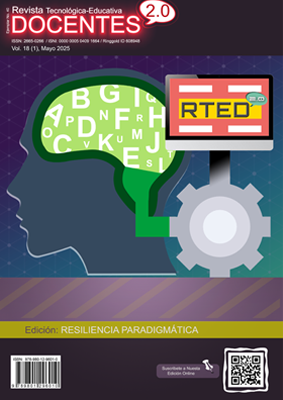Teaching Strategy Based on Critical Thinking to Strengthen Numerical Competencies in Seventh Grade
 DOI:
https://doi.org/10.37843/rted.v18i1.598
DOI:
https://doi.org/10.37843/rted.v18i1.598
Main Article Content
Abstract
In the current educational context, students need to develop numerical skills and critical thinking to meet the challenges of the 21st century. Mathematical skills are fundamental for academic success, daily life, and professional development. The main objective of the research was to strengthen the mathematical skills of seventh-grade students in institutions in Catambuco, Pasto, by using critical thinking to propose and solve problems. Research was carried out within the holistic paradigm, holographic method, with a qualitative approach, interpretive type, propositional, and cross-sectional design. Surveys and questionnaires were applied to 120 students from Catambuco. The results were obtained through statistical analysis; a descriptive statistical analysis was performed with Microsoft Excel. The Spearman-Brown correlation was calculated using SPSS, obtaining a value of 0.785, which indicates a positive, high, and significant correlation, highlighting the need to implement an innovative teaching strategy based on critical thinking to strengthen numerical skills and prepare students to contribute significantly to society.
Downloads
Metrics
Article Details

This work is licensed under a Creative Commons Attribution-NonCommercial-NoDerivatives 4.0 International License.
Those authors who have publications in our journal accept the following terms:
- When a work is accepted for publication, the author retains rights of reproduction, distribution of his/her article for exploitation in all countries of the world in the format provided by our magazine and any other magnetic medium, optical, and digital.
- Authors will retain their copyright and guarantee the journal the right first to publish their work, which will be simultaneously subject to the Creative Commons Acknowledgment License (Attribution-NonCommercial-NoDerivatives 4.0 International (CC BY-NC-ND 4.0)). That allows third parties to copy and redistribute the material in any medium or format, under the following conditions: Acknowledgment - You must properly acknowledge authorship, provide a link to the license, and indicate if any changes have been made. You may do so in any reasonable way, but not in a way that suggests you have the licensor's endorsement or receive it for your use. NonCommercial - You may not use the material for a commercial purpose. NoDerivatives - If you remix, transform, or build from the material, you cannot broadcast the modified material. There are no additional restrictions - You cannot apply legal terms or technological measures that legally restrict you from doing what the license allows.
- Authors may adopt other non-exclusive license agreements to distribute the published version of the work (e.g., deposit it in an institutional archive or publish it in a monographic volume) provided that the initial publication in this journal is indicated.
- Authors are allowed and recommended to disseminate their work through the Internet (e.g., in institutional telematic archives, repositories, libraries, or their website), producing exciting exchanges and increasing the published work's citations.
- Request of withdrawal an article has to be done in writing by the author to the Editor, becoming effective after a written response from the Editor. For this purpose, the author or authors will send correspondence via e-mail: [email protected].
- The author will not receive financial compensation for the publication of his work.
- All Docentes 2.0 Journal publications are under the Open Journal System (OJS) platform at: https://ojs.docentes20.com/.
References
Creswell, J. W. (2013). Qualitative Inquiry and Research Design: Choosing Among Five Approaches (3rd ed.). SAGE Publications.
Del Aguila Allaín, M. (2021). Estrategias didácticas para mejorar el pensamiento crítico en el nivel inicial, provincia de Zarumilla-2021. Universidad Cesar Vallejo
Denzin, N. K., & Lincoln, Y. S. (2018). The SAGE Handbook of Qualitative Research (5th ed.). SAGE Publications.
Estela, R. (2020). Investigación Propositiva. Módulo 1. I. P. Indoamerica. https://n9.cl/ffup4
Gómez, J., & Valero, A. (1995). Estrategias innovadoras en la educación matemática. Revista de Investigación en Educación Matemática, 15(2), 123-145. http://hdl.handle.net/1992/32054
Hernández, R., Fernández, C., & Baptista, P. (2014). Metodología de la investigación (6ta ed.). McGraw-Hill.
Herrera León, D. (2020). Programa basado en proyectos de resolución de problemas para desarrollar el pensamiento crítico en los estudiantes del nivel inicial. https://n9.cl/d08od
Hurtado, J. (2010). Guía para la comprensión Holística de la Metodología de la ciencia. Ediciones Quirón.
Hurtado, J. (2012). El Proyecto de Investigación, Comprensión Holística de la Metodología de la investigación. Editorial Quirón.
Hurtado, J. (2015). El Proyecto de Investigación, Comprensión Holística de la Metodología de la investigación. Editorial Quirón.
Mera, J. (2022). Estrategias innovadoras para el desarrollo de competencias numéricas. Revista de Educación Matemática, 15(2), 45-60. https://doi.org/10.1234/abcd5678
OECD. (2023). PISA 2022 Results, I: The State of Learning and Equity in Education. OECD Publishing. https://doi.org/10.1787/53f23881-en DOI: https://doi.org/10.1787/53f23881-en
Parreño Sanchez, J. D. C. (2024). Programa de inteligencia artificial para mejorar el pensamiento crítico en estudiantes de bachillerato, de una institución educativa, Ecuador 2023 [Tesis Doctoral]. https://n9.cl/qpz5t
Rodríguez, L., & Pineda, I. (2009). Métodos de enseñanza en matemáticas: Una evaluación crítica. Editorial Educa, 12(3), 45-67. DOI:10.22463/25909215.1759 DOI: https://doi.org/10.22463/25909215.1759
Sánchez, H. (1996). Metodología de la investigación científica. INIDE.
Vera, J. (2022). Experiencia pedagógica en el diseño y aplicación de estrategias y recursos educativos para el desarrollo de competencias numéricas. Código Científico Revista de Investigación, 3(3), 16-40. https://n9.cl/erokn






